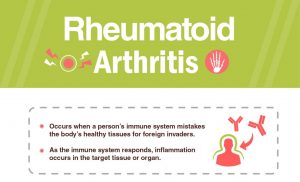Symptoms of High Rheumatoid factor

Rheumatoid factor is an antibody made by the body’s immune system. Like other antibodies, rheumatoid factor does not kill germs or fight infections. It can attack and damage healthy tissue in the body.
A blood test called rheumatoid factor test determines the level of rheumatoid factor in the body. High rheumatoid factor is associated with certain autoimmune diseases, especially rheumatoid arthritis.
This article discusses the rheumatoid factor, the causes and symptoms of high rheumatoid factor, its risk factors, and more.
What is the Rheumatoid factor?
Rheumatoid factor is an antibody made by the immune system. Usually, antibodies are made by the immune system when it detects foreign substances in the body (like germs, allergens or toxins). The antibodies attack the foreign substance.
The immune system makes rheumatoid factors either by mistake or when it is over-active. Rheumatoid factors can attack and damage the healthy tissues.
What Causes High Rheumatoid factor?
A high rheumatoid factor is typically associated with autoimmune diseases. In an autoimmune disease, the immune system destroys the healthy tissues.
One of the most common autoimmune diseases associated with a high rheumatoid factor is rheumatoid arthritis. In rheumatoid arthritis, the antibodies attack the joint’s cell lining, eventually destroying the joint and the surrounding bones, cartilage, tendons and ligaments.
Apart from rheumatoid arthritis, the high rheumatoid factor can also be caused by some infections like hepatitis C, tuberculosis, and endocarditis. Some cancers, such as leukaemia, can also cause high rheumatoid factor levels.
What are The Symptoms of High Rheumatoid factor?
Symptoms of rheumatoid factor or rheumatoid arthritis are related to joint pain and inflammation. While rheumatoid arthritis mainly affects the joints, it can also target other tissues and organs in the body, such as the eyes, heart, and lungs.
The symptoms of high rheumatoid factor usually occur and disappear in a cycle and include:
- Pain, stiffness and aching in more than one joint
- Swelling and tenderness in more than one joint
- Same joint problems on both sides of the body
- Joint deformities and loss of joint function
- Loss of appetite
- Fatigue
- Low grade fever
- Weakness
Apart from the joints, rheumatoid arthritis can also affect and cause inflammation in the following tissues and organs:
- Skin
- Eyes
- lungs
- heart
- Kidneys
- Nerves
- Bone marrow
- Blood vessels
What are The Risk Factors of High Rheumatoid factor?
While rheumatoid arthritis is not clearly known, some factors can increase the risk of getting high rheumatoid factor and rheumatoid arthritis. These factors are:
- Age: While rheumatoid arthritis of high rheumatoid factor can occur at any age, middle-aged people are at a higher risk.
- Sex: Women are at a higher risk of high rheumatoid factor levels.
- Family History: Someone with a family history of rheumatoid arthritis is at a higher risk of it.
- Smoking: Smoking can elevate the risk of getting a high rheumatoid factor and rheumatoid arthritis. Furthermore, smoking can also increase the severity of the condition.
- Being Overweight: Excess weight can raise the risk of high rheumatoid factor and rheumatoid arthritis.
- Diet: A diet high in sodium, iron, sugar and red meat can increase the risk of high rheumatoid factors.
How is High Rheumatoid Factor Diagnosed?
A blood test called the rheumatoid factor test (RF test or ra factor test) is used to diagnose high rheumatoid factor. The procedure for the RF test is as follows:
- Clean the skin over a vein in the arm.
- Tie an elastic band around the arm to fill the vein with blood.
- Insert a needle into the vein.
- Using the needle, blood is collected in a sterile vial attached to the needle.
- Cover the insertion site with a sterile gauze.
- Send the blood sample to the lab for an RF test.
A test result of less than 20 IU/mL is considered negative, between 20-60 IU/mL is considered low positive, and over 60 IU/mL is considered high positive. A doctor interprets the test results and advises about any further tests or treatment needed.
A high rheumatoid factor is often associated with rheumatoid arthritis. Rheumatoid arthritis affects the joints and can target other body areas. When left untreated, it can cause joint damage and deformities. Early diagnosis, treatment, and management of rheumatoid arthritis is crucial for a good quality of life.
If an individual presents with any symptoms of a high rheumatoid factor, they should consult a doctor without delay and book a rheumatoid factor test at Dr Lal PathLabs.
FAQs
1. What are the complications of rheumatoid arthritis?
Rheumatoid arthritis can increase the risk of:
- Osteoporosis
- heart disease
- Lung problems
- Lymphoma
- Infections
2. What does a high rheumatoid factor indicate?
A high rheumatoid factor can indicate an autoimmune disease like rheumatoid arthritis. However, the results of the RF test should always be interpreted by a doctor.














